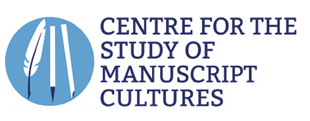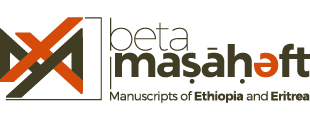Introduction to the Study of Gəʿəz Manuscripts
Fifth Hiob Ludolf Centre Summer School in Ethiopian and Eritrean Manuscript Studies
Online, 21-25 September 2020
From 21 to 25 September 2020, the Hiob Ludolf Centre for Ethiopian and Eritrean Studies - with the support from the Cluster of Excellence Understanding Written Artefacts - organizes its Fifth Summer School in Ethiopian and Eritrean Manuscript Studies entitled "Introduction to the Study of Gəʿəz Manuscripts".
Introduction
Ethiopia and Eritrea boast a rich and ancient (and living) manuscript tradition. Manuscripts are among the cornerstones of cultural heritage, both as means of communication, containers of texts and art, and as objects of material history.
There is no reliable figure for the total number of surviving manuscripts. For Christian Gəʿəz manuscripts, the numbers are likely in hundreds of thousands: there are many thousands churches and monasteries in Ethiopia and Eritrea, each in the possession of at least several manuscripts, with biggest collections counting several hundred codices. The number of historical – most valuable for researchers – manuscripts is diminishing at a quick pace. This underlines the necessity to record what has survived, and analyse the form and the content of these witnesses of the centuries past.
Many of the achievements in Ethiopian and Eritrean manuscript studies from the last few years have been the result of work of scholars based in Hamburg, who have also successfully organized four Summer Schools, vastly appreciated by the students and young scholars of Ethiopian/Eritrean studies, Semitic studies, theology, and related disciplines.
The 2020 Summer School is the first one of its kind to be offered online.
Aims of the school
The school aims at training graduate students and junior scholars in methods used in Ethiopian and Eritrean manuscript studies. Lectures and seminars in topics ranging from History to Philology to Codicology to Cataloguing shall cover the most central aspects of research and help in developing skills necessary for theoretical and practical tasks in the study of manuscripts. Much space shall be offered to discussion as well to group and individual excercises. Practical exercises will include codicological and philological description of manuscripts, palaeographic and art historical analysis.
The school focuses on Christian Gəʿəz manuscript tradition. It is open to students and scholars of all disciplines, but some background in (Christian) oriental studies (not necessarily Gəʿəz) is expected.
Note that immediately after the Summer School, a practical training in digital humanities, TEI for Ethiopian and Eritrean manuscript cataloguing (28-30 September 2020 in the morning) shall take place, also online (via ZOOM).
Provided sufficient interest, students shall also have the chance of additional training in using the GeTa morphological annotator for Ethiopic texts (1-2 October 2020 in the morning). Please check the appropriate box on your application form if you are interested.
Participation
The Summer School shall be conducted in English.
The classes shall take place every day from Monday (Sept. 21) through Friday (Sept. 25), from 10 am to between 4 and 5 pm CET.
In addition, three public evening lectures will take place between 5 pm and 6 pm.
20 participants shall be selected on a competitive basis from all qualified applications that will reach us before the deadline (17 August 2020).
All students will receive a certificate of participation.
Organizers
Convenor HLCEES / Cluster of Excellence Understanding Written Artefacts:
Prof. Dr. Alessandro Bausi
Contact address: aethiopistik"AT"uni-hamburg.de



